Daily Current Affairs and GK | 1 September 2020

Main Headlines:
- 1. 13th President of India, Pranab Mukherjee passes away.
- 2. Over 960 stations solarized by Indian Railways.
- 3. Indian Railways develops MEDBOT.
- 4. First commercial direct flight between Israel and the UAE reaches Abu Dhabi.
- 5. Para swimmer Satyendra Singh Lohia- first Divyang sportsperson of the country to win Tenzing Norgay Adventure Award.
- 6. RBI announces steps to ease pressure on liquidity.
- 7. India has emerged as the key player in global organic marketing.
- 8. World’s largest Solar Tree built by CSIR-CMERI.
- 9. Super Speciality Trauma Centre of Vijayanagar Institute of Medical Science, Ballari inaugurated.
- 10. Dr. Saroj Ghose, Father of Science Centre Movement, turns 85.
- 11. Labour Bureau releases CPI-IW for July 2020.
- 12. Karnataka to bring Special Investment Region Act.
Happy February get 35% Off
Use Coupon code FEB26
1. 13th President of India, Pranab Mukherjee passes away.
- The 13th President of India, Bharat Ratna Pranab Mukherjee, has passed away, and the government has declared seven-day long state mourning till September 06.
- He went into septic shock due to lung infection and was operated for removal of a clot in the brain.
- He has served as 13th President of India from 2012 to 2017 and was awarded Bharat Ratna in 2019. He was also awarded Padma Vibhushan in 2008.
- His term as President of India was preceded by Smt. Pratibha Devisingh Patil and succeeded by Shri Ram Nath Kovind.
- Apart from serving as 13th President of India, Pranab Mukherjee has also served as Finance Minister twice from 1982-1984 and from 2009-2012.
- He has also served as Minister of Defence, Minister of External Affairs, and Deputy Chairman of the Planning Commission.
- He was recognized as the best Finance Minister in World (1984) and Finance Minister of Year for Asia (2010).
- He has written books such as Beyond Survival: Emerging Dimensions of Indian Economy, Off the Track: A Few Comments on Current Affairs, The Dramatic Decade: The Indira Gandhi Years, The Turbulent Years: 1980–1996, and The Coalition Years: 1996–2012.
- The State Mourning involves flying of the National Flag at half-mast on all buildings throughout India, where it is flown regularly, and there will be no official entertainment.
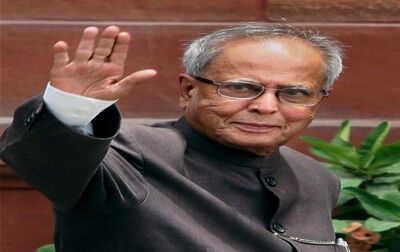
(Source: News on AIR)
2. Over 960 stations solarized by Indian Railways.
- To meet energy consumption needs through solar power, Indian railways has solarized over 960 stations till now.
- It has also placed orders for 198 MW solar rooftop capacity for 550 stations.
- It is working to become net-zero carbon emitter before 2030 and achieve 100 percent electrification by the year 2023.
- It also has plans to meet all its energy consumption needs of over 33 billion units by 2030 by producing solar energy. Currently, the annual requirement of Indian railways is 20 billion units.
- It has plans to use its vacant land by 2030 to install solar plants of 20 GW capacity.
- Indian Railways:
- It comes under the Ministry of Railways.
- Indian railways network is fourth-largest in the world by size.
- It was founded on May 8, 1845.
- Currently, it is divided into 18 zones and 70 divisions, with South Coast Railway Zone being the newest zone.
- Vinod Kumar Yadav is the current Chairman of the Railway Board.
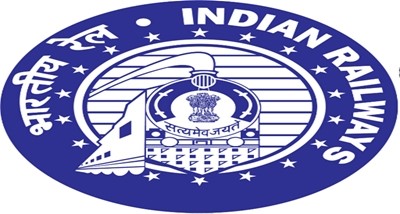
(Source: News on AIR)
3. Indian Railways develops MEDBOT.
- Indian Railways has developed MEDBOT, a remote-controlled medical trolley.
- MEDBOT has been developed to deliver food and medicines to COVID-19 patients.
- Currently, MEDBOT is providing services in Central Hospital of the Diesel Rail Engine Factory of Indian Railways.
4. First commercial direct flight between Israel and the UAE reaches Abu Dhabi.
- The first commercial direct flight between Israel and the UAE has yesterday reached Abu Dhabi, the capital of UAE.
- The relations between UAE and Israel returned to a normal state after they reached an agreement (Abraham Accord) with the help of the USA on August 13, 2020.
- In the past, Israel has kept diplomatic relations with only two Arab Countries (Egypt and Jordan), and UAE became the third such country after the recent Abraham Accord.
- Normally, Saudi Arabian airspace used to be blocked for Israeli air traffic. But, the flight was allowed to cross it.
Israel and UAE:
|
Country |
Israel |
United Arab Emirates (UAE) |
|
Location |
Middle East (on Mediterranean Sea) |
Western Asia (at the northeast end of the Arabian Peninsula) |
|
Capital |
Jerusalem |
Abu Dhabi |
|
Currency |
Israeli shekel |
United Arab Emirates Dirham |
|
Prime Minister |
Benjamin Netanyahu |
Mohammed Bin Rashid Al Maktoum |
|
President |
Reuven Rivlin |
Khalifa bin Zayed Al Nahyan |

5. Para swimmer Satyendra Singh Lohia- first Divyang sportsperson of the country to win Tenzing Norgay Adventure Award.
- Para swimmer Satyendra Singh Lohia has become the first Divyang sportsperson of the country to win the Tenzing Norgay Adventure Award.
- In August 2019, he became the first Asian swimmer to cross the Catalina Channel of the USA.
- On World Divyang Day (December 03), he was awarded Best Sportsperson National Award by Vice President.
- He is from Gwalior, Madhya Pradesh. Earlier, he has been awarded Vikram Award, the highest sports award in Madhya Pradesh.
- Yogesh Malaviya has been awarded the Dronacharya Award. He is a Malkhamb trainer. He is also from MP.
- Along with Satyendra Singh Lohia, other winners of the Tenzing Norgay Adventure Award are given in the following table.
|
S. No. |
Name of the Sportsperson |
Category |
|
1. |
Ms. Anita Devi |
Land Adventure |
|
2. |
Col. Sarfraz Singh |
Land Adventure |
|
3. |
Shri Taka Tamut |
Land Adventure |
|
4. |
Shri Narender Singh |
Land Adventure |
|
5. |
Shri Keval Hiren Kakka |
Land Adventure |
|
6. |
Shri Satyendra Singh |
Water Adventure |
|
7. |
Shri Gajanand Yadava |
Air Adventure |
|
8. |
Late Shri Magan Bissa |
Life Time Achievement |
- Tenzing Norgay Adventure Award:
- It is given for adventure on land, sea and air. A certificate and Rs. 5 lakh cash is given to the awardee.
- It is the highest national recognition for outstanding achievements in adventure on land, sea and air. It is at par with the Arjuna award.
6. RBI announces steps to ease pressure on liquidity.
- To ease pressure on liquidity, RBI has announced steps such as term repo operations of Rs. 1 lakh crore in mid-September.
- Term repo operations of Rs. 1 lakh crore will be carried out at floating rates, i.e., at the prevailing repo rate.
- Term repo operations will be carried out to ease pressure on liquidity due to advance tax outflows.
- Advance tax payments cause liquidity pressures as money moves out of the banking system when companies withdraw funds to make advance tax payments.
- RBI has also announced special open market operations of Rs 20,000 crore in two parts of Rs 10,000 crore each on September 10 and September 17, 2020.
- During open market operation, RBI will simultaneously purchase and sell Government Securities.
- RBI has also given options to banks for getting funds at the current repo rate of 4% by returning the funds received under long-term repo operations (LTROs) at a repo rate of 5.15%. This will reduce the interest liability of banks.
- RBI has also allowed banks fresh acquisitions of SLR securities acquired from September 01, 2020, under the Held-To-Maturity (HTM) category up to an overall limit of 22% of their net demand and time liabilities (NDTL) till March 31, 2021.
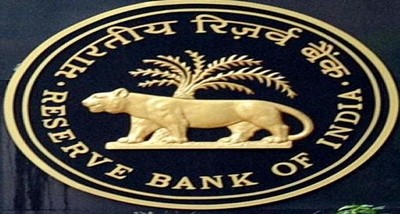
(Source: News on AIR)
7. India has emerged as the key player in global organic marketing.
- India ranks first in the number of farmers practicing organic farming.
- India ranks ninth in terms of area under the cultivation of organic crops. As of March 31, 2020, the total area under the organic certification process (registered under NPOP) is 3.67 million Hectare (2019-20).
- Among different states, Madhya Pradesh is the largest producer, followed by Maharashtra, Karnataka, Uttar Pradesh, and Rajasthan.
- In India, Sikkim was the first state to become fully organic, and states like Tripura and Uttarakhand have set targets to soon become fully organic.
- Mission Organic Value Chain Development for North East Region and Paramparagat Krishi Vikas Yojana in 2015 were launched to promote organic farming.
- The e-commerce platform jaivikkheti.in was launched to directly link farmers with the retail as well as bulk buyers.
- Flax seeds, sesame, soyabean, tea, medicinal plants, rice, and pulses are some of the major organic exports from India.
- Organic farming is a technique of farming that does not involve the use of chemical fertilizers, pesticides, etc. but uses methods like crop rotation, organic manure, etc. to protect soil fertility.
- National Program on Organic Production (NPOP) looks after the export requirements under the Foreign Trade Development Regulation Act. It looks after the domestic market and inputs under Agriculture Produce Grading, Marking, and Certification Act.
- The Agricultural and Processed Food Products Export Development Authority (APEDA) is the implementing agency for NPOP.
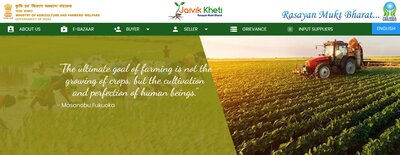
(Source: Jaivikkheti.in)
8. World’s largest Solar Tree built by CSIR-CMERI.
- The world’s largest Solar Tree has been developed by CSIR CMERI and is installed at CMERI Residential Colony in Durgapur.
- The installed capacity of this Solar Tree is more than 11.5 kWp.
- This solar tree can generate 12,000-14,000 units of Clean and Green power.
- The solar tree has been designed in such a way to ensure minimum Shadow Area so that these can be used for agricultural activities as well.
- The cost of each solar tree is Rs. 7.5 lakhs.
- The solar tree can incorporate IoT based features including real-time humidity, wind speed, rainfall forecast, etc.
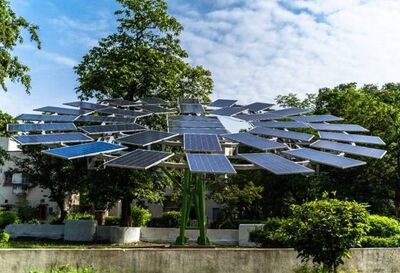
(Source: PIB)
9. Super Speciality Trauma Centre of Vijayanagar Institute of Medical Science, Ballari inaugurated.
- Health Minister Dr. Harsh Vardhan and Chief Minister of Karnataka B.S. Yediyurappa inaugurated the Super Speciality Trauma Centre (SSTC) in Vijayanagar Institute of Medical Sciences, Ballari.
- The Express Feeder Line, ICU wards, 13KL Liquid Medical Oxygen Tank of the facility and the State-of-the-Art CT Scan were also inaugurated.
- The Super Speciality Trauma Centre has been built under the Pradhan Mantri Swasthya Suraksha Yojana (PMSSY).
- Pradhan Mantri Swasthya Suraksha Yojana (PMSSY):
- The scheme was launched in 2003.
- It aims to curb regional imbalances in the field of tertiary healthcare services.
- It also aims to promote facilities for quality medical education in India.
- The scheme has two components-
- Setting up of AIIMS like institutions
- Upgradation of Government Medical College/Institutions
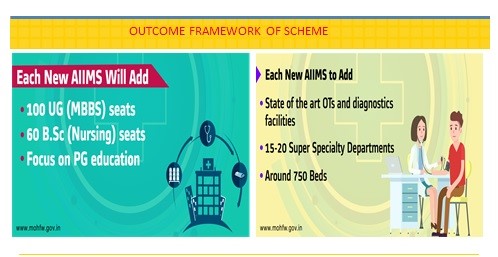
(Source: MoHFW)
10. Dr. Saroj Ghose, Father of Science Centre Movement, turns 85.
- The Father of Science Centre Movement in India, Dr. Saroj Ghose, has turned 85.
- He is also known as museum maker. He played an important role in establishment of the National Council of Science Museums (NCSM) in 1978.
- Nehru Science Centre at Mumbai was India’s first Science Centre. Mobile Science Museum (now called Mobile Science Exhibition) was launched by Birla Industrial & Technological Museum (BITM) in 1965 when Dr. Saroj Ghose took charge of BITM.
- Currently, 48 Mobile Science Exhibition buses are being operated by the National Council of Science Museums (NCSM) all over the country.
- This is recognized as the largest and longest running Non-Formal Science Education Programme in India by Limca Book of Records.
- In 1979, a municipal garbage ground at Worli in Mumbai was changed into the world’s first science park by Dr. Saroj Ghose.
- He was awarded Padma Shri in 1989 and Padma Bhushan in 2007.
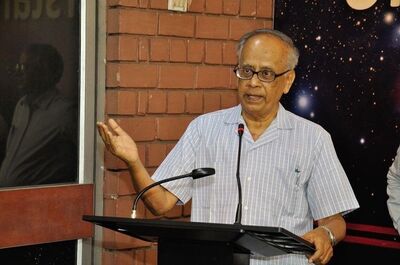
(Source: PIB)
11. Labour Bureau releases CPI-IW for July 2020.
- Labour Bureau has released Consumer Price Index for Industrial Workers (CPI-IW) for July 2020.
- There has been an increase of 4 points in All-India CPI-IW for July 2020. Currently, it stands at 336.
- Between June and July 2020, All-India CPI-IW has increased by 1.20%. It has increased by 0.95% between June and July 2019.
- An increase in CPI-IW is due to Housing and Food Group items. The housing group contributed maximum (2.28%) to increase in CPI-IW. The housing group was followed by food group, which caused an increase of 1.77%.
- At the level of industrial centres, Jamshedpur has shown a maximum increase. It is followed by Haldia.
- Indices for 31 industrial centres are above all India CPI-IW. Indices for 45 centres are below all India CPI-IW.
- For July 2020, Year-on-year inflation based on all-items was at 5.33 and food inflation stood at 6.38%.
- CPI-IW:
- It was started in October 1946. It is the oldest CPI available in India.
- It is compiled by Labour Bureau on a monthly basis. Labour Bureau is an attached office of the Ministry of Labour & Employment.
- CPI-IW is based on the retail price of selected items from 289 markets across 78 industrially important centres in the country.
- It is released on the last working day of the coming month. For example, CPI-IW for July 2020 has been released on August 31, 2020, the last working day of August 2020.
12. Karnataka to bring Special Investment Region Act.
- Karnataka will bring Special Investment Region Act and declare Dharwad, Kalaburagi, and Shivamogga as special investment regions.
- The act will ensure that industries are distributed evenly in the state. Earlier, Gujarat has also framed similar legislation.
- The government wants to take industries to Tier-2 and Tier-3 cities.
- Earlier, the Karnataka government faced criticism for amendment in land reforms act and allowing industrialists to purchase land directly instead of purchasing through KIADB (Karnataka Industrial Areas Development Board) or agencies of state government.
- Karnataka:
- It is a state in South western region of India. It came into existence on 1 November 1956.
- The capital is Bengaluru.
- State Governor: Vajubhai Vala, Chief Minister: B.S. Yedyurappa.
- The state animal is the Indian elephant, the state bird is Indian roller, the state tree is sandalwood and the state flower is Lotus.
- Karnataka has 28 seats in Lok Sabha and 13 seats in Rajya Sabha.





 31 August 2020 Current Affairs
31 August 2020 Current Affairs 








Comments